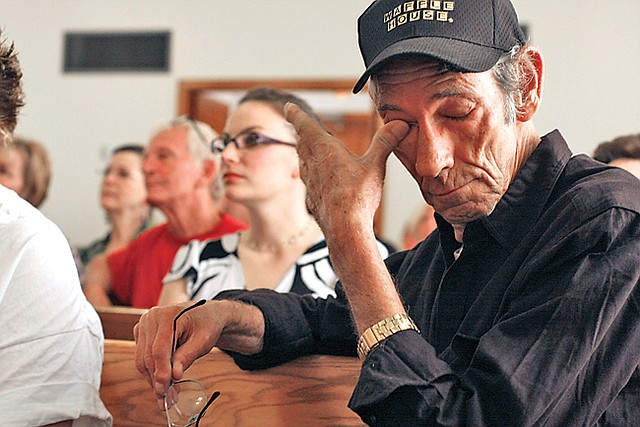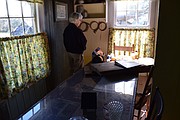Fury and faith
Monday, May 2, 2011
RELATED ARTICLE:• Severe weather and tornado resources
Sunday school at Apison United Methodist Church is supposed to start at 9 a.m., but no one here is interested in sticking to the schedule.
Just outside the small, 80-member church, which kept its stained glass windows and white steeple in Wednesday's storms, police enforce blockades on roads turned to rubble. Dump trucks and crews building power lines pass by.
But in the fellowship hall, those who make it to church cry when they see one another. Some haven't showered in four days, but they hold each other tight for a long time.
An age-old question of faith is now at their front door, and some want an answer.
"Pastor, don't the Lord control the universe?" asks Gene Gambrell, whose nearby home was shredded by a tornado. Now in his 70s, he and his wife, Roxie, will be forced to move to another state to live with their daughter. "Why would he let something like this happen?"
He and Roxie, who is disabled and uses a wheelchair, planned to spend the rest of their lives here in Apison, their home of 50 years. But nothing is left, and it's too late to start over.
"You work your whole life for something, and in five minutes it's blown away," he tells pastor Todd Chancey. "I don't understand why."
When tornados or hurricanes or tsunamis come, carelessly picking victims and turning neighborhoods into disaster zones, faith can spring alive. Those who haven't talked to God in years can find themselves on their knees. Scriptures get dusted off. Offering plates and pews are full.
Spiritual leaders stay up late practicing their Sunday messages, knowing their flocks will hang on every preached word, sing every line of a five-stanza hymn.
Acts of kindness happen everywhere. Water for the thirsty. Food for the hungry. Beds for the homeless. People build roofs for those they haven't met, spend hours in the hot sun chain-sawing toppled trees or digging through trash for keepsakes.
Good things are happening all over this region, pastors tell their church families. God loves us, they say, and we love each other.
But anger can surface, too, a question - often unspoken - about how a loving God allows tragedy without warning, without reason.
At Apison Baptist Church, across a field from the Methodist church, the pastor is preparing services for two church members killed in the storm.
"He called me and asked for prayer," Chancey tells his church. "It's the hardest things he said he's ever had to deal with."
Piano music fades and the conversation quiets in the sanctuary as Chancey prepares to read the names of the storm's victims to the crowd. People are hungry for news. Cell phone towers are down. Phone lines are dead. And many church members are without power.
"Harry and Louise have 30 trees on top of their house. The barns are gone. They don't know where their cows are," he says.
"The Clouds' house and the Colbys' house were completely destroyed."
"The Crowden family lost everything."
"Gene and Roxie lost everything."
"Connie and Bill, their whole roof's down," he says.
He has a stack of Wal-Mart gift cards in his pocket for anyone who needs a generator or food. He tells them to make sure to register with the Federal Emergency Management Agency, the Red Cross and the United Way for aid.
At 3 p.m. church members plan to build a temporary roof on one member's home.
Sunday night they are getting teachers from Apison Elementary together to pray for the children.
"As adults we have a hard time getting through this," he tells the congregation, crying. "But our little ones see the same things."
A church in Roswell, Ga., has offered to take children from Apison to Lake Winnepesaukah next week. He says parents should send their children to give them a day away from the wreckage.
Then he calls for prayer, and the altar fills with people on their knees, sobbing. Others stand behind them, putting hands on their backs.
"Heavenly father," Scott Neal prays for the group. "We thank you for another day. The evidence of your provision is all around us. We don't understand why these things have to happen.
"We lay before you all our family and friends and neighbors, whose lives have been turned upside down. ... Give us beauty from these ashes."
Like so many pastors Sunday, Chancey doesn't really know how to explain the mysteries of the God he believes in. He doesn't know how absolute judgment and absolute love co-exist in the Bible or how they balance out on this Earth.
He just chooses to believe the best, that God is good and all things, in the end, will have been for a reason.
This is what Chancey tries to echo when Gambrell looks at him, searching for comfort in his crisis of faith.
"It happens to good people, and it happens to the bad. God still loves you in the midst of this," Chancey tells him. "One day the sun will shine again, and we'll see God's hand moved in this."

